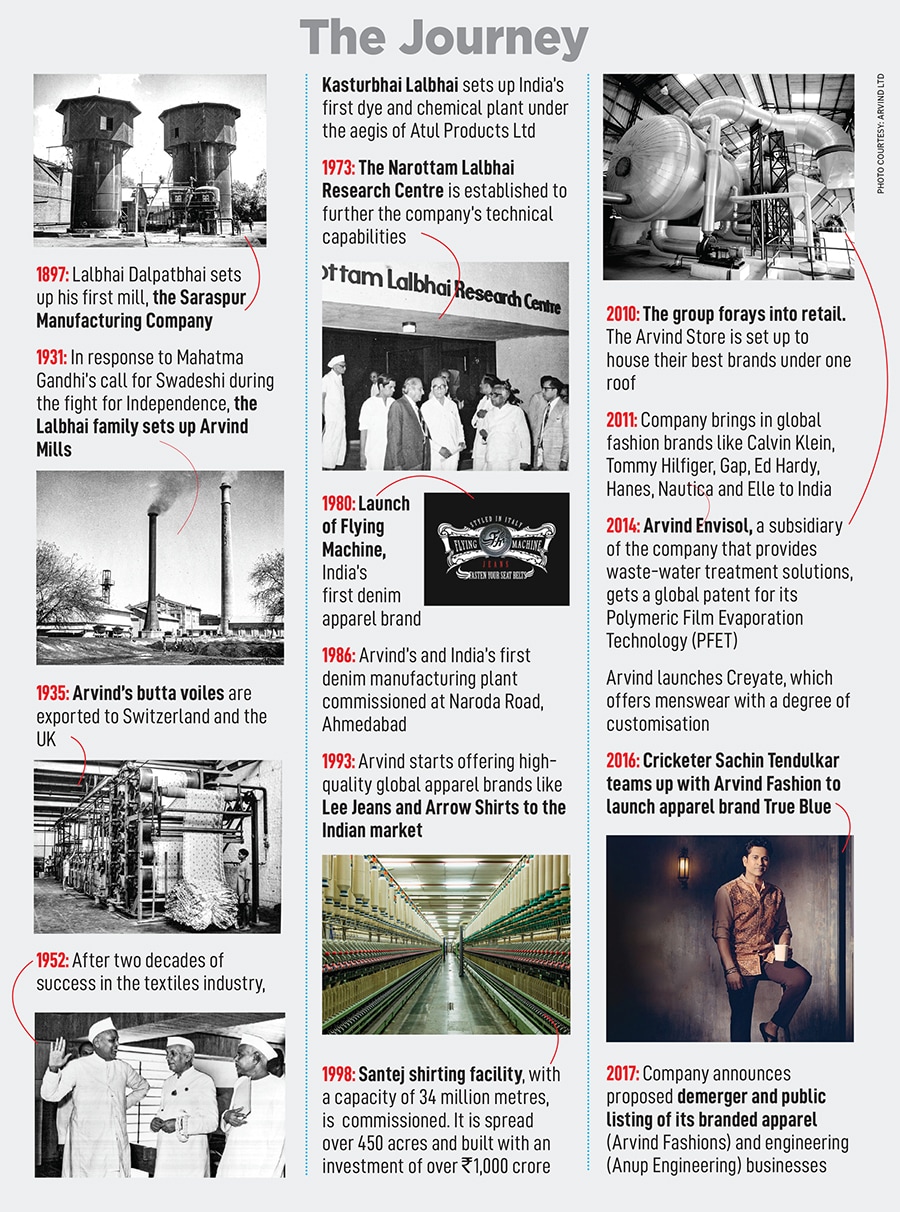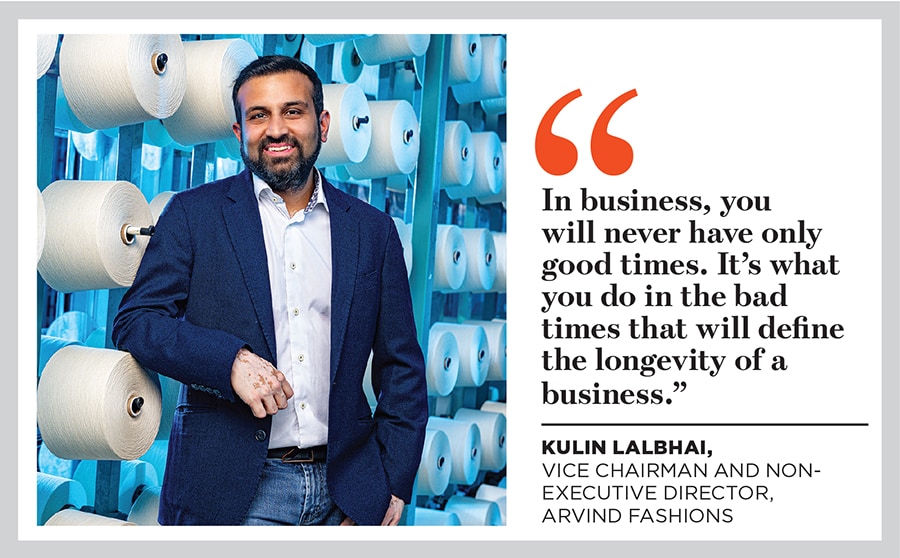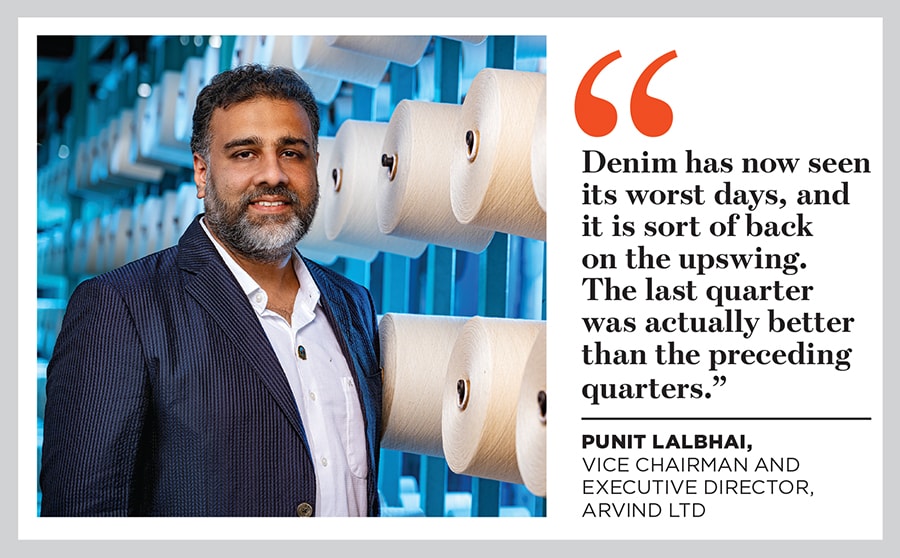The second-generation entrepreneur and founder of textile company Arvind Limited was passionate about art and education. At 17, after his father’s death, Kasturbhai had to drop out of school and take over the mantle of running the business. This made him an avid reader—the collection of books in his library ranges from economics to literature and politics, and more. He also set up some of the premier educational and research institutions, including the Indian Institute of Management-Ahmedabad (IIM-A), along with his confidant and neighbour Vikram Sarabhai. Setting up the museum was the brainchild of fourth-generation scion Sanjay Lalbhai and his wife Jayshree. They wanted to keep the family legacy alive and pay tribute to their grandfather."¯
The ancestral property also has an upcoming indigo museum, curated by the denim king, who has played a pivotal role in making Arvind Limited a force to reckon with in the textiles sector. The business was going through a turmoil when Sanjay, son of Shrenik Lalbhai, joined the company in 1977. The power loom sector challenged big mills by edging labour laws and manufacturing standards to make cheaper garments. This led him to manufacture denims in-house, a breakthrough during those years.
Flying Machine became India’s first denim apparel brand. “If you’re an entrepreneur, you have to reinvent the company many times. When I joined, the company had existential problems. So, I had to reinvent the business and do a major surgery," he tells Forbes India, sitting in one of their oldest mills in Naroda, Ahmedabad.
Again, with changing times and a cluttered market, denim is no longer Arvind’s mainstay. The company’s 92-year-old journey is a narrative of both opportunities and obstructions, and each generation has managed to build enduring businesses despite the constantly changing economic landscape. New businesses have been incubated throughout the history of Arvind, which continues till today with the fifth generation at the helm. After stepping away from main business operations, the 69-year-old patriarch passed the baton to sons Punit and Kulin.
Pointing to his sons, the senior Lalbhai says, “They have completely taken charge. My role is more of a mentor now. I’m here when needed. Otherwise, most of the time, I’m involved with building the museums and other educational initiatives."
Fifth generation at helm
The roles and responsibilities have become clear after a massive demerger in 2019. The branded apparel business, which has a portfolio of global brands, including US Polo, Tommy Hilfiger and Calvin Klein, was spun off into Arvind Fashions. The engineering business, which manufactures critical process equipment for the oil and gas, petrochemicals and pharma industries, was demerged into Anup Engineering.
The Lalbhai Group now has four listed companies on Dalal Street. Elder son Punit looks after Arvind Limited, which includes the generations-old textiles business and advanced materials textiles business, and Anup Engineering. Kulin leads the branded portfolios and retail business under Arvind Fashions and the company’s real estate development arm, Arvind SmartSpaces.
“If we end up incubating new businesses, they could then, in the future, also be spun off as separate companies. There will always be businesses that are transformed, new business lines that get created, but then having a focus-listed entity is the right way to go," says Kulin."¯
![]()
Arvind has been looking to reduce its dependence on traditional textiles, particularly denim. Its new-age technical textiles business is seeing an upward growth trajectory, contributing ₹2,000 crore to the overall revenue. It’s an effort to branch out into other areas of material science and cash in on the versatile structure of textiles, which can be applied to more than just apparel. At Advanced Materials, explains Punit, the company manufactures a range of specialised clothing and accessories that protect factory workers, firefighters, construction crew, soldiers, and health care and security personnel from the harsh operating environments of their jobs.
“We also have composites, where we make the interiors of Vande Bharat Express trains lightweight using glass and epoxy composites. Additionally, we make the fabric out of fiberglass fabrics, which go into windmill blades," says the 41-year-old, who joined the company in 2007 and is now the vice chairman and executive director.
He is also passionate about ornithology and conservation, which have contributed to building sustainable businesses. Punit, who has an MBA from INSEAD, a bachelor’s degree in conservation biology from California, and a master’s in environmental sciences from Yale University, also spearheads Arvind Envisol, the water treatment business. “Through many years of effort, we’ve been able to eliminate all freshwater from production. So 100 percent of the water used in production is recycled. And through that learning, we gained a lot of knowledge on water treatment. So, then we started consulting with other companies, and consulting led to acquiring technology. We have executed more than 65 water treatment projects across the world," he adds."¯
![]() Punit runs the B2B side of operations, while younger brother Kulin is expanding the B2C reach. One of the key learnings from his master’s at Harvard Business School, he says, is to constantly disrupt and reinvent the business. “When I joined the business, the trend of ecommerce was catching on in the late 2000s," recalls Kulin. “I put together a team of 150 young people to build a digital stack from scratch, and today, almost 30 percent of Arvind Fashions’ business is generated from the online business."
Punit runs the B2B side of operations, while younger brother Kulin is expanding the B2C reach. One of the key learnings from his master’s at Harvard Business School, he says, is to constantly disrupt and reinvent the business. “When I joined the business, the trend of ecommerce was catching on in the late 2000s," recalls Kulin. “I put together a team of 150 young people to build a digital stack from scratch, and today, almost 30 percent of Arvind Fashions’ business is generated from the online business."
After his master’s at Harvard and a BSc in electrical engineering from Stanford University, Kulin worked as a management consultant at McKinsey & Co prior to joining the family business. He also manages 1,200 stores across India and a retail presence in 3,000 shop-in-shops.
Arvind SmartSpaces, another business managed by Kulin, recently signed two large, horizontal (plots and villas), multi-use, golf-themed development projects spread across 704 acres in south Ahmedabad. The potential revenue from them is estimated to reach ₹2,300 crore.
The brothers are diversifying into new areas, keeping up with the times, and also maintaining the ethos of their legacy business. All generations realise the importance of staying ahead of time, strengthening the conglomerate with the right investments at the right place, and most importantly, talent. The group believes in working hand-in-hand with professionals. Innovation DNA and perseverance are secret sauces that have kept the centuries-old business up and thriving.
Taking khadi to the world"¯
In 1931, in response to Mahatma Gandhi’s call for Swadeshi during the fight for Independence, the Lalbhai family founded Arvind Mills, creating a capacity to compete with the world’s finest textile mills. By 1935, Arvind’s butta voiles were being exported to Switzerland and the UK, thereby realising the full potential of the spirit behind Swadeshi.
The current generation has kept the ball rolling. In July 2017, Khadi and the Village Industries Commission (KVIC) signed an agreement with Arvind to trade khadi denim products around the world. Since then, Arvind Mills has been purchasing large quantities of khadi denim fabric every year from KVIC-certified khadi institutions in Gujarat.
![]()
Both fabrics are woven cotton, but denim is highly mechanised, and khadi is crafted by skilled hands. The combination of the two fabrics was introduced almost a decade ago. Arvind and KVIC put in years of effort into research and development to bring this hybrid fabric together.
In 2022, US-based leading fashion brand Patagonia placed a repeat order for khadi denim fabric. Through Arvind Mills, the company purchased 17,050 metres of khadi denim fabric worth nearly ₹80 lakh from Udyog Bharti, a Rajkot-based khadi institution in Gujarat. The repeat order came after the completion of the previous order for 30,000 metres of khadi denim fabric worth ₹1.08 crore. Patagonia uses handcrafted khadi denim fabric for making denim apparel.
![]()
Growth Trajectory
The group began with textiles and, with time, expanded to other sectors like brands, real estate, engineering, technical textiles, telecom services and water treatment. The company has worked relentlessly to reduce its debt in the flagship company, Arvind Ltd, and its brand company, Arvind Fashions Ltd, explains Prerna Jhunjhunwala, vice president, research, textiles and retail at Elara Capital. “Margin improvement and balance strengthening are the key areas of improvement going forward."
Of all the businesses, technical textiles, real estate and engineering are doing well. However, the textiles business is under pressure due to a weak demand in domestic and international markets. Denim businesses are affected by oversupply in the market. Arvind Fashions is working hard to improve the acceptance and positioning of a few brands to improve overall performance.
“Largely, Arvind Limited’s revenue is likely to grow by a high single digit over the next two to three years, driven by a focus on the garments and technical textiles businesses. Margins are likely to improve by 200 to 300 basis points over the same period, driven by an improved revenue mix, cost reduction measures undertaken, improved efficiencies in the company, and a clear focus on improving the profitability of each business segment," says Jhunjhunwala.
The company’s technical textiles businesses are performing well, with an expected revenue growth of 20 percent compound annual growth rate (CAGR) over the next two to three years, and mid-teen margins. Though the company is facing intense competition, it has been able to weather the storm through higher scale, strong market reputation, and product innovation, she adds.
Gross margins have declined from 52.9 percent in FY19 to 45.6 percent in FY23. There is no major improvement in profitability yet, though the company is working on improving the same. Its low return on capital employed (ROCE) has increased to 12.2 percent in FY23 from 7.9 percent in FY19. Net debt has decreased from ₹2,619 crore in FY19 to ₹1,327 crore in FY23, and further to ₹1,301 crore in Q1FY24.
Historically, Arvind was a low ROCE business. However, post-demerger, the company has been focussed on its core business in the respective entities, and has worked on deleveraging the balance sheet as well as improving profitability and return ratios. Investors expect the management to continue to walk down the same path, explains an analyst from Aionios Alpha.
![]()
Way Forward"¯
Arvind is targeting a revenue growth of 12 to 15 percent in the next few years on the back of strong growth of about 25 percent in the advance materials business and 20 percent growth in the garments business, says Jayesh Shah, director and group CFO of Arvind. The company plans to invest about ₹600 crore in two years to help achieve this growth.
“The garments business, which saw a sharp reduction in capacity utilisation during Covid, has started to bounce back and is expected to grow at 18 percent over the next two years," he adds.
On that note, Lalbhai shares some words of wisdom: “One of the lessons of my many years in business has been that once you get into a liquidity trap, all your creative things stop, and then you’re fighting for survival. And when you go into survival mode, then all the good things come to a halt."
Different generations of the family have dabbled with different tough scenarios. “In business, you will never have only good times. It’s what you do in the bad times that will define the longevity of a business. From our forefathers’ generations until now, we have seen the worst of times. But we’ve pushed through and only come out stronger," says Kulin.

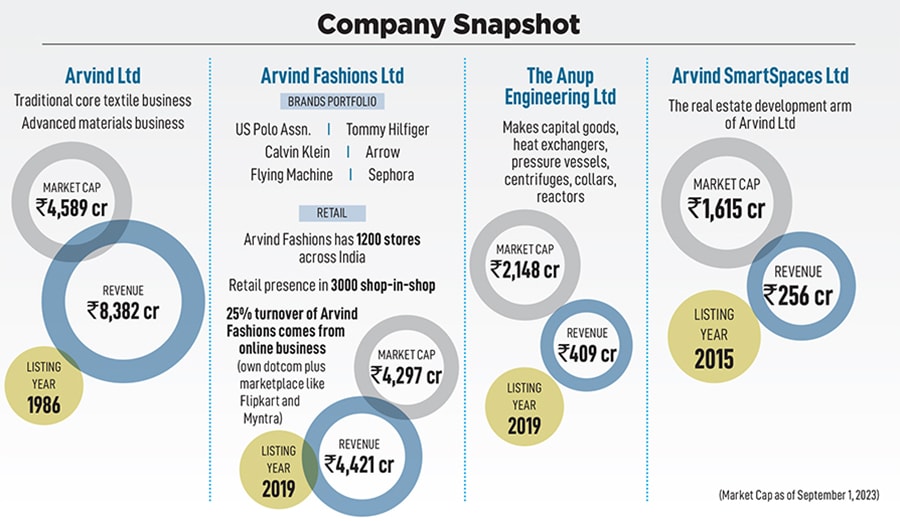
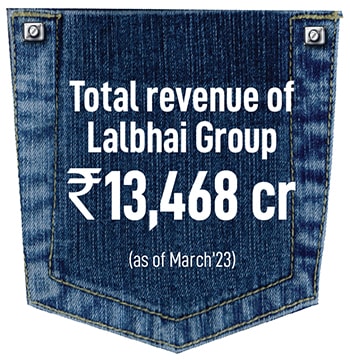 Punit runs the B2B side of operations, while younger brother Kulin is expanding the B2C reach. One of the key learnings from his master’s at Harvard Business School, he says, is to constantly disrupt and reinvent the business. “When I joined the business, the trend of ecommerce was catching on in the late 2000s," recalls Kulin. “I put together a team of 150 young people to build a digital stack from scratch, and today, almost 30 percent of Arvind Fashions’ business is generated from the online business."
Punit runs the B2B side of operations, while younger brother Kulin is expanding the B2C reach. One of the key learnings from his master’s at Harvard Business School, he says, is to constantly disrupt and reinvent the business. “When I joined the business, the trend of ecommerce was catching on in the late 2000s," recalls Kulin. “I put together a team of 150 young people to build a digital stack from scratch, and today, almost 30 percent of Arvind Fashions’ business is generated from the online business."